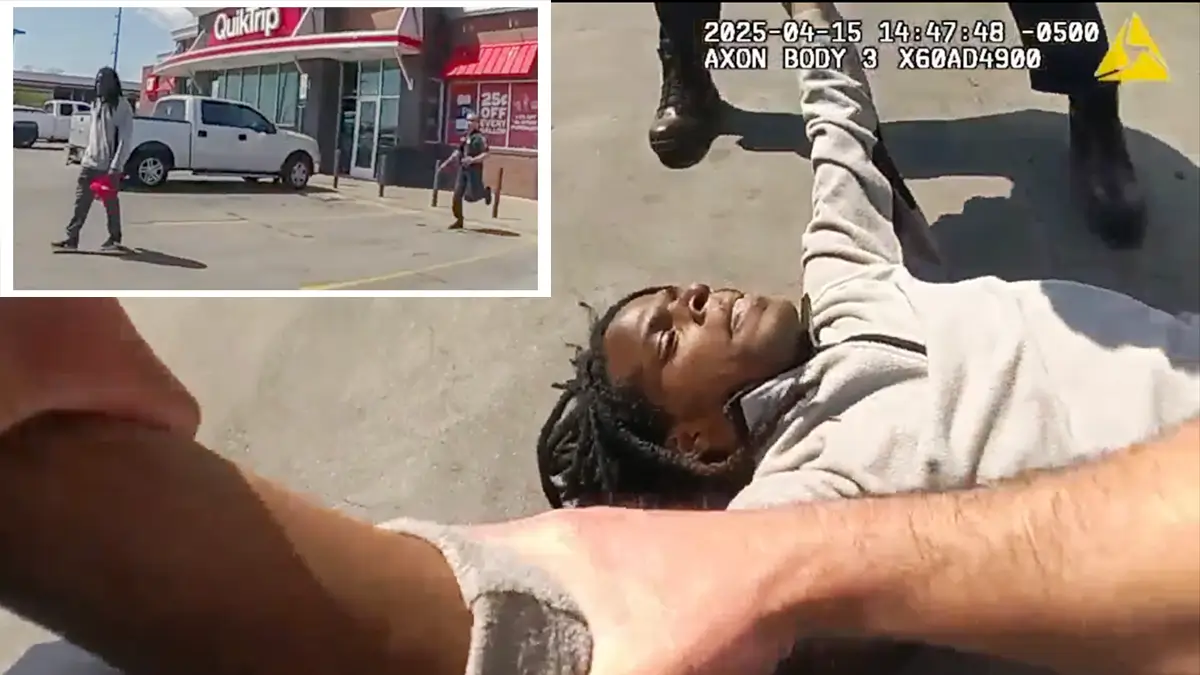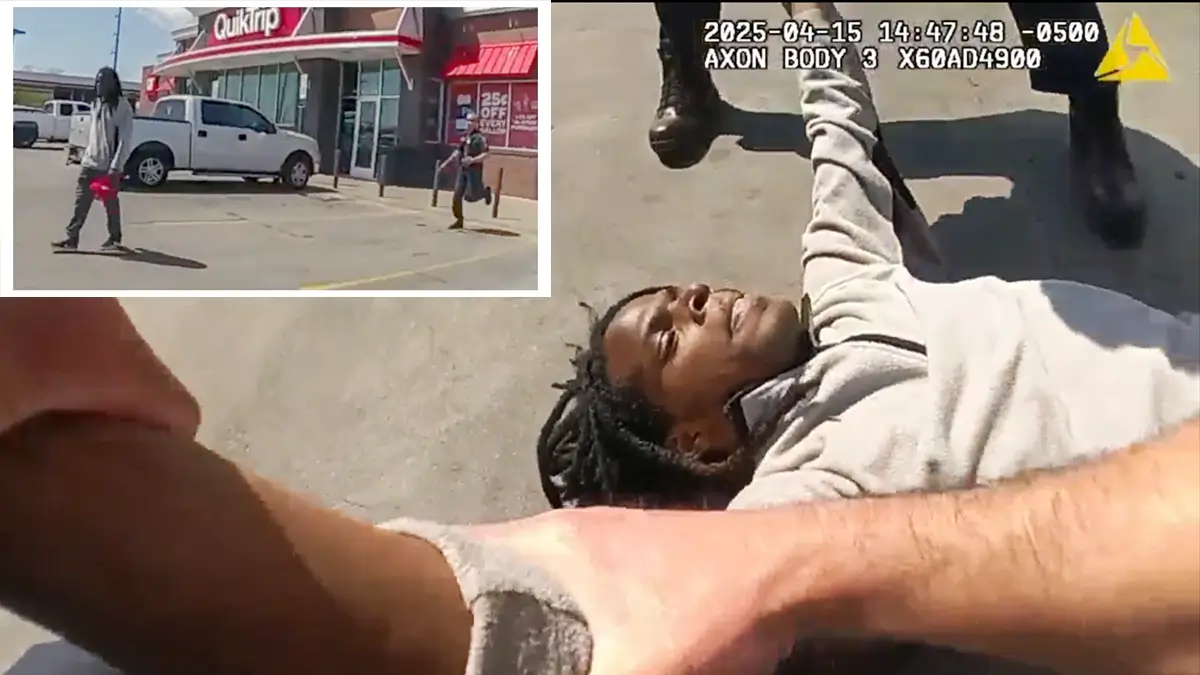‘Y’all Just Ran Me Over, Bro’: Black Man Stopped for Jaywalking Is Run Over By Cop Car After Officer Neglects to Place Car In Park
It was over a jaywalking allegation that Oklahoma cops detained a Black man before allowing a patrol car to run him over after a cop neglected to place the car in park.
“Y’all just ran me over, bro,” Kemonte Hampton repeatedly cried out in pain, according to the body camera footage obtained by KJRH-TV.
Tulsa police said the 25-year-old Black man tried to run away when stopped by police, but police video released to local media shows him strolling across a parking lot with a cop behind him when the second cop pulls up in his patrol car.
The second cop orders him to get on the ground, and Hampton bends down to comply while the first cop runs up and shoves him from behind. Hampton is not resisting arrest as a patrol car that had not been placed in park rolls over Hampton, causing him to cry out in pain.

Local media removed that portion from the video, saying it was too graphic, but the video posted below shows Hampton appeared to be in severe pain. However, police claimed he had suffered only minor injuries, but we have yet to hear from Hampton himself about his injuries.
Tulsa police also told local media it was important to enforce jaywalking infractions because there had been an uptick of violent crime in the area, explaining that jaywalking infractions gave the cops probable cause to search them for guns, drugs, or warrants.
In other words, police were detaining him for jaywalking as a pretextual stop, a legal but controversial practice used by police at a much higher rate against Black people compared to white people. It has also led to an increase of police violence against Black people.
“Across all jurisdictions, the median stop rate disparity was police stopping Black people 2.6 times as often as white people,” according to a 22-page report published in 2024 titled Compounding Anti-Black Racial Disparities in Police Stops.
But rather than acknowledge they were racially profiling Hampton, Tulsa police blamed the pretextual stop on demands from the community.
“Is jaywalking a minor infraction? Yes,” Tulsa Police Captain Richard Muelenberg said to KJRH-TV.
“But it comes on the demands of the community saying, ‘Hey, we have major crimes out here—do something.’”
Deadly Police Force
It is true that the intersection where the incident took place, 11th and Garnett, is considered one of the most crime-ridden neighborhoods in Tulsa, with high poverty rates.
But it is unlikely the community wanted police to racially profile citizens for Walking While Black, considering the Tulsa Police Department has historically been one of the deadliest law enforcement agencies in the country.
“Tulsa Police Department has been ranked as one of the deadliest for civilians in the nation, according to year-by-year police killing data from Mapping Police Violence,” reported The Black Wall Street Times, a Black-owned news site located in the Greenwood District of Tulsa, site of the horrific 1921 massacre where mobs of white people attacked and killed Black citizens, destroying homes and businesses.
“In fact, TPD has had the fourth-highest rate of police killings per one million people between 2013 and 2025.”
Fortunately, Hampton did not die. Police found no drugs or weapons on him, and he did not have active warrants for his arrest.
Nevertheless, he was charged with the misdemeanors of improper walking and obstructing an officer, according to online records from Tulsa County’s court system which states he is scheduled for a jury trial on Oct. 20.
Pretextual Stop Case Law
While racial profiling has been part of policing in this country from the very beginning, it was not until 1996 that the United States Supreme Court ruled that it was not unconstitutional, according to the decision written by Justice Antonin Scalia.
The temporary detention of a motorist upon probable cause to believe that he has violated the traffic laws does not violate the Fourth Amendment’s prohibition against unreasonable seizures, even if a reasonable officer would not have stopped the motorist absent some additional law enforcement objective.
However, in 2022, the Fifth Circuit Court of Appeals denied qualified immunity to Arlington police officer Craig Roper, who shot and killed a Black man named Tavis Crane in Texas after using a pretextual stop to pull him over in 2017.
The Fifth Circuit Court of Appeals referred to the 1996 Supreme Court decision as outdated, stating the following in its decision:
In 1996, the Supreme Court approved the use of pretextual stops in Whren v. United States. Since then, pretextual stops have become a cornerstone of law enforcement practice. Police officers follow a suspicious person until they identify a traffic violation to make a lawful stop, even though the officer intends to use the stop to investigate a hunch that, by itself, would not amount to reasonable suspicion or probable cause.
Often pulled over for minor traffic violations, these stops create grounds for violent — and often deadly — encounters that disproportionately harm people of color.
When Whren was decided, the Court did not have what we have now — twenty-five years of data on the effects of pretextual stops. Indeed, the Whren Court differentiated pretextual stops from “extreme practices” like the use of deadly force.
Today, traffic stops and the use of deadly force are too often one and the same—with Black and Latino drivers overrepresented among those killed—and have been sanctioned by numerous counties and major police departments.
Crane’s family ended up settling for $1.9 million last year.
And we anticipate Hampton will also file a lawsuit, considering multiple studies have shown that police across the country enforce jaywalking laws at a much higher rate against Black people.
Last year, New York City decriminalized jaywalking after a 2019 study revealed that 90 percent of the people stopped for jaywalking were either Black or Latino, despite making up 55 percent of the city’s population.
California also passed a similar law in 2023, but as Atlanta Black Star reported last year, Black people are still being abused and arrested for jaywalking.
Watch the Tulsa police video below.

